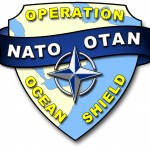Operation Ocean Shield in trouble for ships
 (BRUSSELS2) On this blog, we commented on the capability shortcomings of the EU's anti-piracy operation (EUNAVFOR Atalanta) at the beginning of the year. Obstacles overcome. But its little NATO sister, "Ocean Shield", is also struggling. And in a more increased and, it seems, more sustainable way. NATO's anti-piracy operation is in fact languishing, currently with only a few ships - currently 3 or even 2. Tailor-made for the Turkish and Danish navy, it continues to benefit from regular support from these countries: one or two Turkish ships and half the year of a Danish ship. But that's about all...
(BRUSSELS2) On this blog, we commented on the capability shortcomings of the EU's anti-piracy operation (EUNAVFOR Atalanta) at the beginning of the year. Obstacles overcome. But its little NATO sister, "Ocean Shield", is also struggling. And in a more increased and, it seems, more sustainable way. NATO's anti-piracy operation is in fact languishing, currently with only a few ships - currently 3 or even 2. Tailor-made for the Turkish and Danish navy, it continues to benefit from regular support from these countries: one or two Turkish ships and half the year of a Danish ship. But that's about all...
The other allies have other fish to fry and when they can make a boat available, they put it in other operations - EUNAVFOR in particular - or bilaterally. The Americans themselves seem to have other priorities in the region - notably with Iran - or further afield Korea and China. And they are already supporting another operation, set up on their initiative, CTF 151. As for the British, the question is more raw. Under constant budget pressure, Nelson's fleet is asked to clearly define its commitments; it therefore only has one permanent ship in the entire Indian Ocean. And, here again, the situation in the Strait of Hormuz requires more attention than the fight against piracy...
The operational and rational logic would order to close this operation by reinforcing one or the other of the international coalitions. But a solution would have to be found to involve the Turkish and Danish or Canadian navies in the European operation, for example. What is not obvious - the process of involving external partners in EU operations is rather cumbersome. And it comes up against two major political obstacles: the Danish opt-out on defense on the one hand; the Turkish-Cypriot deadlock which is troubling the other's NATO-EU relations (and this is not about to change under the Cypriot presidency, except for a last-minute initiative). For a country like Turkey, this operation - like Operation Active Endeavor - also allows ships to continue to cross in a regional area that it considers strategic, with a laudable objective (the fight against piracy or the fight against terrorism). Finally, the internal logic of an organization like NATO does not weigh in this direction. It's never "easy to close an operation" explains a diplomat working for the organization.
